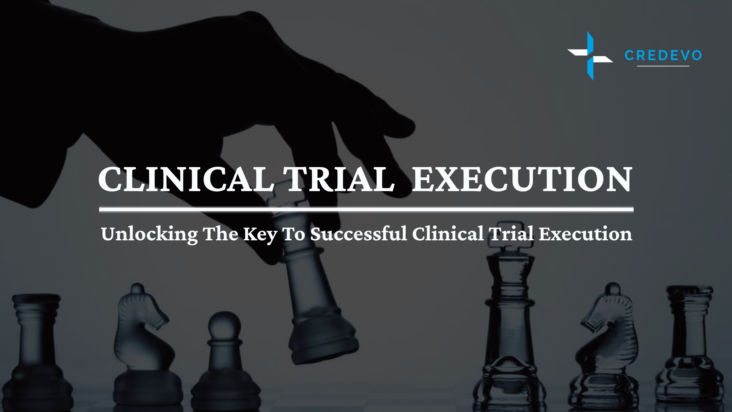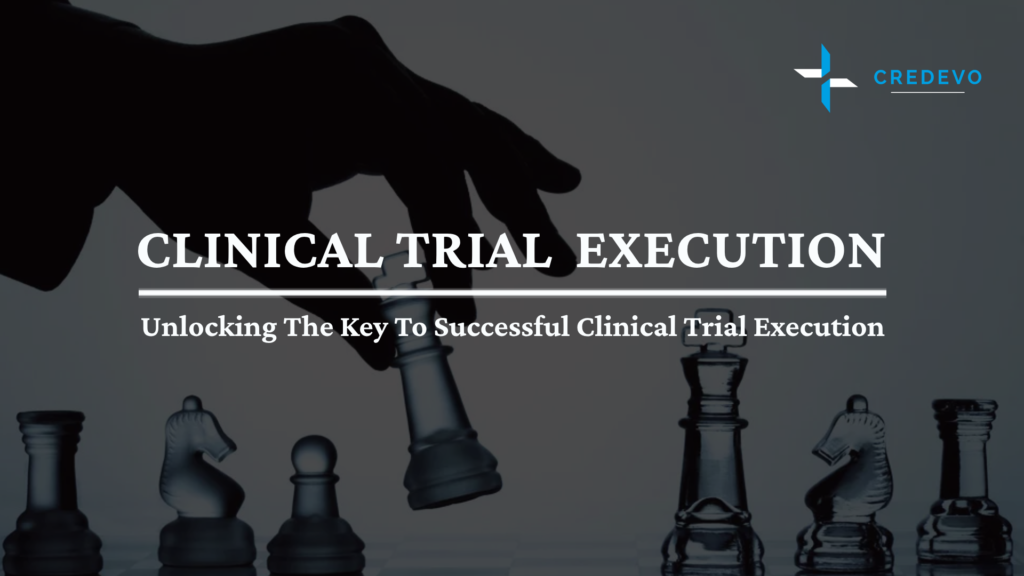Unlocking The Key To Successful Clinical Trial Execution

Executing a clinical trial with precision and effectiveness is crucial for achieving meaningful and reliable results. From meticulous planning to efficient implementation and data management, we need to explore essential strategies and best practices to optimize the execution of clinical trials.

In this article, we explore key elements that unlock success in clinical trial execution and strategies to minimize delays and failures due to increased costs.
What is a clinical trial strategy?
Clinical trial strategy refers to the overall plan and approach designed to conduct a clinical trial successfully. It involves defining the objectives, study design, patient population, endpoints, treatment protocols, and data collection methods.
A well-defined clinical trial strategy provides a roadmap for the entire trial, guiding decision-making and ensuring that the trial meets its intended goals. By carefully crafting a clinical trial strategy, researchers can achieve several important objectives. By defining objectives, identifying the target population, selecting trial designs, and planning recruitment strategies, researchers create a comprehensive clinical trial strategy.
This strategy considers regulatory requirements, ethical considerations, and resource allocation, ensuring a compliant and efficient trial execution. Such thoughtful planning enhances the chances of successful clinical trial execution and reliable results.
Click here to learn about the clinical development strategy in rare disease
Key components of a clinical trial strategy include:
- Study Objectives: Clearly define the primary and secondary objectives of the trial, such as assessing the safety, efficacy, or comparative effectiveness of a treatment or intervention.
- Study Design: Determining the appropriate study design, such as randomized controlled trials, observational studies, or adaptive trials, based on the research question, available resources, and ethical considerations.
- Patient Population: Identifying the target patient population that best represents the intended use of the treatment or intervention under investigation.
- Treatment Protocols: Establishing the specific treatment regimens, dosage, administration procedures, and follow-up protocols for participants.
- Endpoint Selection: Defining the measurable outcomes or endpoints that will be used to evaluate the effectiveness of the treatment or intervention, such as clinical outcomes, biomarkers, or patient-reported outcomes.
- Recruitment and Retention: Developing strategies to effectively recruit and retain participants, including identifying eligible participants, implementing recruitment campaigns, and ensuring participant engagement throughout the trial.
- Data Collection and Analysis: Establishing robust data collection methods, data management systems, and statistical analysis plans to ensure the collection of high-quality and reliable data.
- Ethical Considerations and Regulatory Compliance: Ensuring the trial adheres to ethical guidelines and regulatory requirements, including obtaining necessary approvals from ethics committees and regulatory authorities.
- Risk Management: Identifying potential risks and developing risk mitigation strategies to minimize the impact of adverse events or unexpected occurrences during the trial.
- Timeline and Budget: Creating a realistic timeline and budget that considers the resources required for successful trial implementation and completion.
A well-developed clinical trial strategy maximizes research efficiency, result accuracy, and participant safety.
Need support in providing a strategic roadmap for conducting your clinical trial? Or do you need any assistance with your ongoing trial? Provide your requirements in the form below to connect with our team and achieve your clinical trial goals.
Site Selection and Activation: Finding the Right Sites
Site selection and activation are crucial for successful clinical trial execution. The process involves identifying experienced sites with suitable patient populations, conducting rigorous feasibility assessments, establishing effective contracts and budgets, and facilitating efficient site initiation and training.
By carefully choosing sites with relevant experience and patient access, trials can increase the chances of successful recruitment and data collection. Thorough assessments and comprehensive agreements ensure that selected sites have the necessary capabilities and resources.
Streamlining site initiation and providing proper training further contribute to smooth trial implementation. Prioritizing site selection and activation sets the foundation for a successful clinical trial, enabling the study to meet its objectives effectively.
Participant Recruitment and Retention: Engaging and Retaining Participants
Participant recruitment and retention are vital for successful clinical trials. Strategies such as targeted recruitment, streamlined enrollment processes, and innovative retention approaches play a crucial role in engaging participants and minimizing dropouts. By effectively recruiting participants through tailored messages and simplified enrollment procedures, trials can ensure the enrollment of eligible individuals.
Additionally, maintaining regular communication, providing support, and addressing participant concerns help to foster a supportive environment and enhance retention. These efforts contribute to accurate data collection, maximize study success, and demonstrate a commitment to participant well-being.
Ensuring participant engagement and retention in clinical trials is crucial for accurate data collection and overall study success. By targeting recruitment, streamlining enrollment, and innovating retention, trials can attract eligible participants and reduce dropouts.
Effective communication, support, and addressing participant concerns throughout the trial help create a supportive environment that motivates participants to remain engaged. These efforts contribute to reliable results and advancements in medical knowledge while demonstrating a commitment to participant welfare.
Are you experiencing difficulties in patient recruitment? Or do you need assistance in accelerating your clinical trial, please provide your requirements by emailing [email protected]. Our team will connect with you to provide appropriate support.
Data Collection and Management: Ensuring Accuracy & Compliance
Data collection and management are critical components of clinical trials, ensuring accurate and compliant gathering of information. Robust systems like electronic data capture (EDC) streamline the collection process, minimizing errors and enhancing efficiency. Site staff receives training to adhere to data collection procedures and comply with study protocols. Regular monitoring visits verify data accuracy and assess site compliance with regulatory guidelines and best practices, guaranteeing the integrity of the collected data.
Proper data management practices are vital for maintaining the quality and privacy of clinical trial data. Documentation, organization, and secure storage of data are key aspects. Adherence to data privacy regulations and protection of participant information is paramount, ensuring confidentiality and upholding ethical standards. Rigorous data management protocols ensure result integrity and enable trust in clinical trial findings.
Accurate and compliant data collection, coupled with robust data management, is crucial for the success of clinical trials. Reliable data plays a crucial role in enhancing the credibility and validity of study outcomes. It enables researchers to make informed decisions and contribute to the advancement of medical knowledge. To ensure the accuracy and quality of collected data, clinical trials should implement efficient data collection systems.
This involves establishing streamlined processes, leveraging technology like electronic data capture (EDC), and providing comprehensive training to site staff. Regular monitoring visits are conducted to assess data accuracy and ensure adherence to regulatory guidelines. By prioritizing these measures, clinical trials uphold data integrity and contribute to meaningful research findings.
Do you need our support in data management, EDC, and other software tools for the efficient management of your clinical trials? Please provide your required details below to connect with us.
Adaptability and Problem-Solving: Overcoming Challenges
Adaptability and problem-solving are vital in the face of challenges encountered during clinical trials. By proactively addressing obstacles, developing contingency plans, fostering innovation, and seeking input from stakeholders, trials can effectively overcome hurdles. Anticipating and adapting to emerging issues ensures the trial’s efficiency and successful execution.
This proactive approach allows for adjustments to study protocols, recruitment strategies, and data collection or analysis methods as needed. Remaining flexible and open-minded allows clinical trials to adapt, innovate, and uphold scientific rigor and regulatory compliance. Seeking input from stakeholders fosters collaboration and promotes effective problem-solving, leading to the overall success and integrity of the trial.
Effective Communication and Collaboration: Facilitating Teamwork
Clear communication channels among stakeholders, promoting collaboration, regular meetings, and technology platforms facilitate effective teamwork. These strategies enhance coordination, problem-solving, and progress monitoring for successful clinical trial execution.
Quality Assurance and Compliance: Upholding Ethical Standards
Rigorous quality assurance processes, audits, prompt issue resolution, and ethical practices ensure compliance and participant welfare. By upholding high ethical standards, clinical trials maintain data integrity and prioritize participant safety.
Successful clinical trial execution requires a comprehensive and well-executed approach. Implementing key strategies and best practices unlocks the full potential of clinical trials, resulting in meaningful outcomes and advancements in medical research.
Do you need our assistance or support in accelerating your clinical trials and achieving your clinical trial goals faster?
We support you in every aspect of clinical development, right from the planning stage through creating strategies to completion. Provide your details below to connect with us and explore our services.